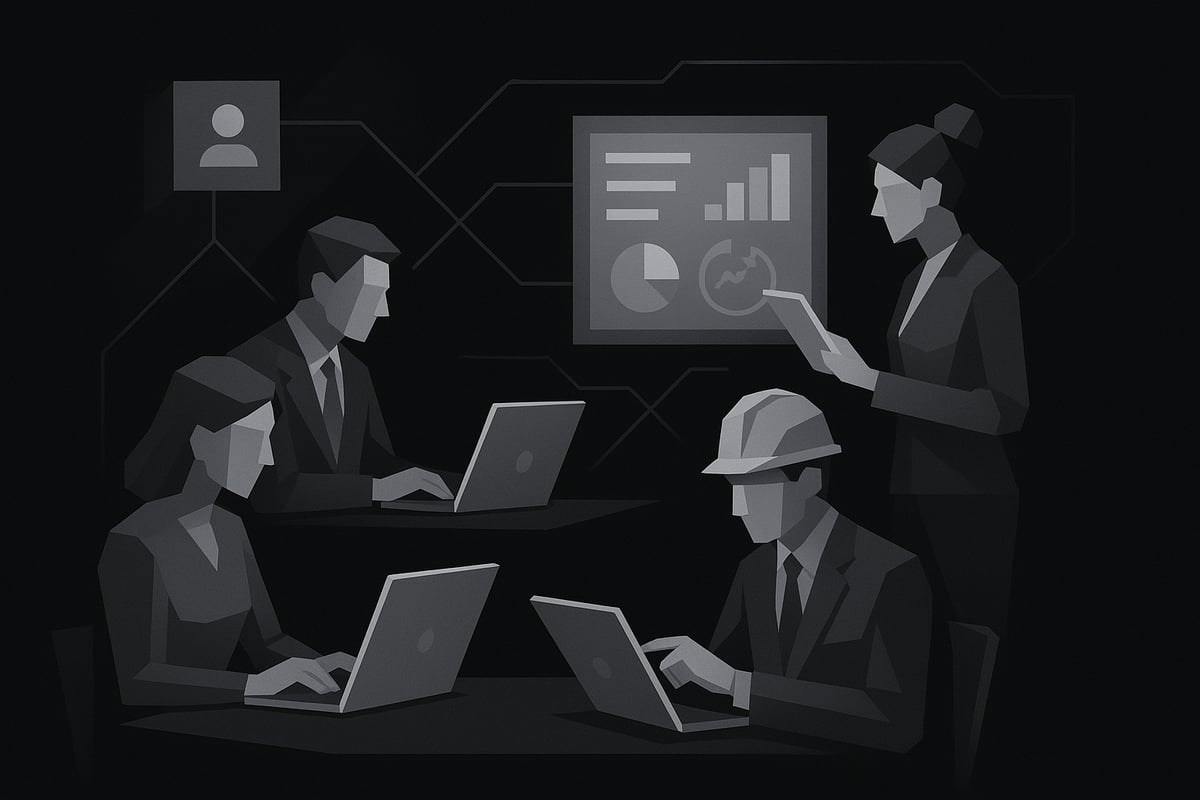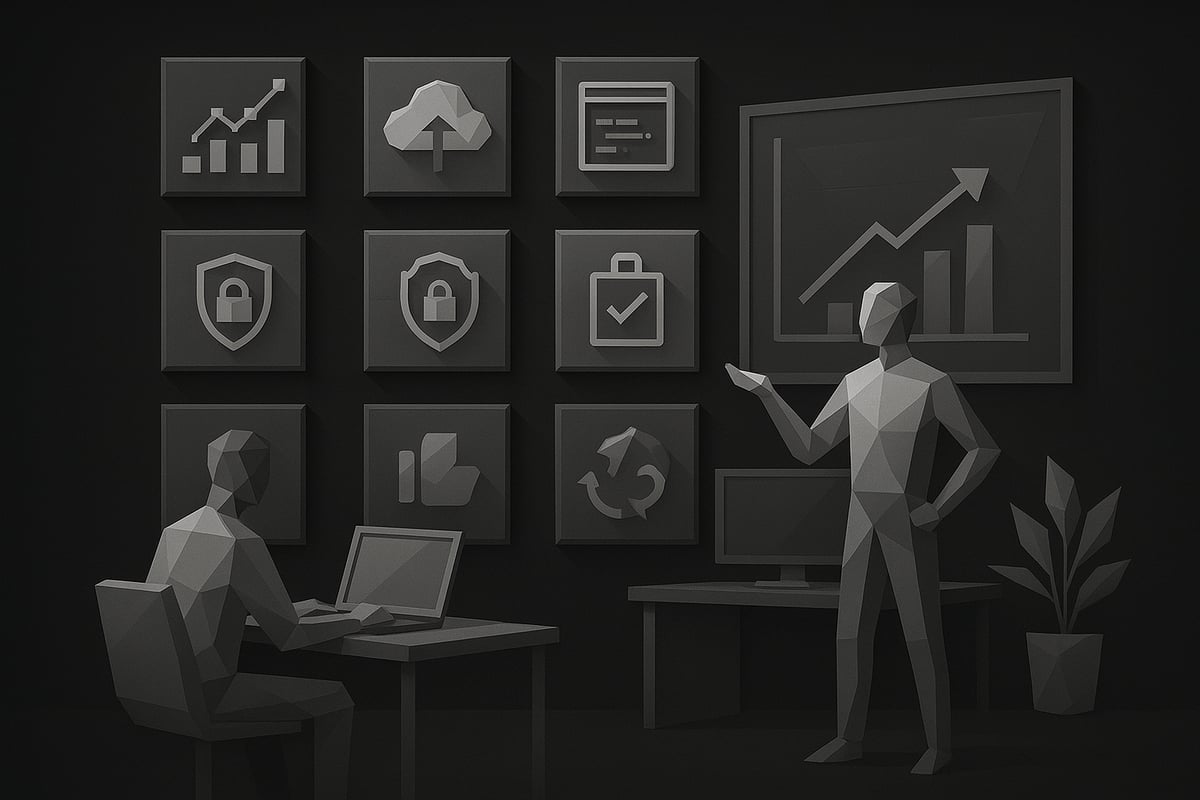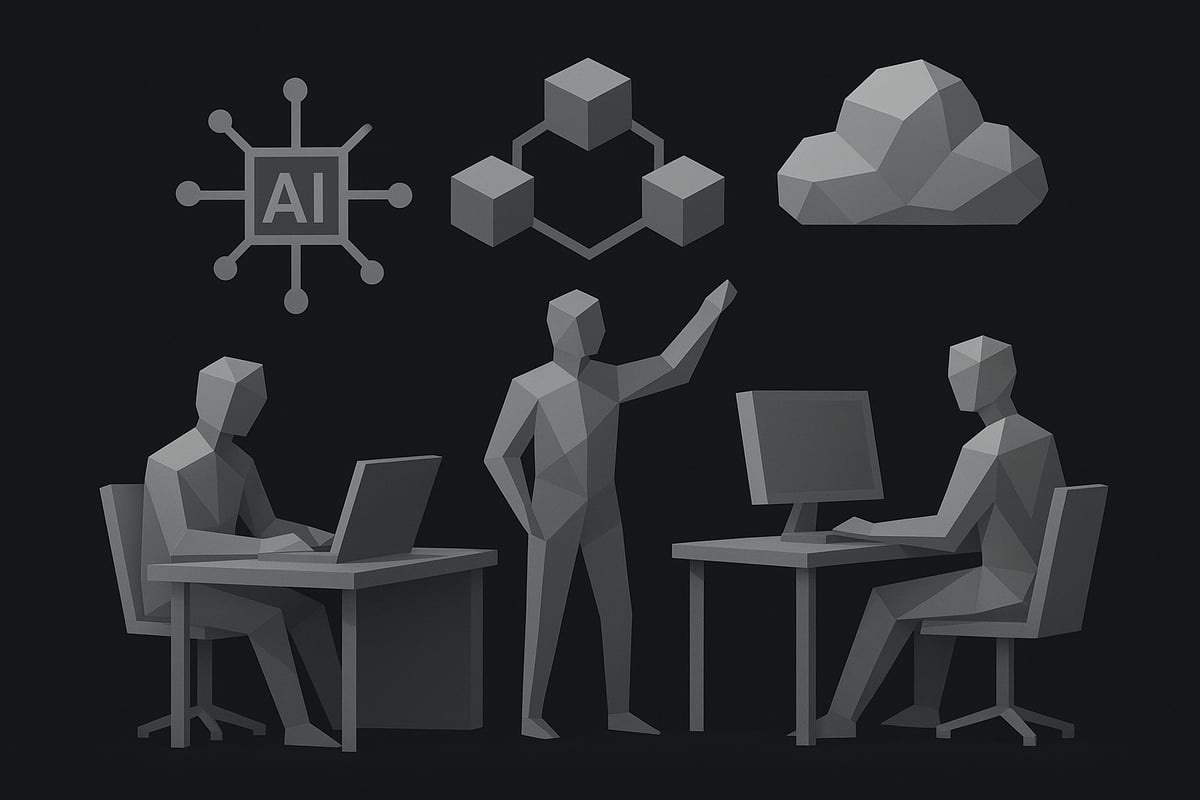The digital workplace is evolving at a pace few could have predicted, and by 2026, adapting to new technology will no longer be optional. Every industry is transforming, and professionals who keep pace will be the ones advancing their careers.
Today, mastering digital skills is essential for staying relevant and employable. Digital skills examples include everything from data analysis and online collaboration to cybersecurity awareness and digital marketing. These abilities are now central to how organizations operate and innovate.
In this post, we will explore 9 essential digital skills examples you need for career success in 2026. Are you ready to assess your strengths and discover where you can grow? The future belongs to those who prioritize continuous digital learning.
The Growing Importance of Digital Skills in 2026
The digital landscape is evolving at breakneck speed, with organizations worldwide embracing new technologies faster than ever before. The urgency to adapt is clear as digital transformation initiatives, once considered optional, have become central to business strategies in every sector.
In this environment, professionals who master digital skills examples are not just keeping up—they are setting themselves apart. The ability to navigate digital tools and platforms is now fundamental, influencing everything from daily workflows to long-term career trajectories.

The Acceleration of Digital Transformation
Digital transformation has accelerated across industries since the pandemic, reshaping how organizations operate, communicate, and compete. From finance to healthcare, companies are investing in automation, cloud computing, and data analytics to drive efficiency and innovation. This shift has made digital skills examples a core requirement for both technical and non-technical roles.
According to recent reports, the demand for digital proficiency is outpacing supply. Many businesses are struggling to find talent with the necessary digital skills to support their growth. This trend is expected to intensify by 2026, as organizations further integrate advanced technologies into their operations.
The Widening Digital Skills Gap
Despite widespread recognition of the need for digital competencies, a significant digital skills gap persists. Survey data from the World Economic Forum and LinkedIn Learning highlights that millions of jobs remain unfilled due to a shortage of qualified candidates with digital expertise.
The OECD report on digital skills demand underscores the urgency for upskilling, noting that businesses and governments alike must prioritize workforce development to remain competitive. Digital skills examples such as data literacy, cybersecurity, and digital communication are now prerequisites for career advancement in many fields.
Automation, AI, and Remote Work: Shaping the New Skillset
Automation and artificial intelligence are redefining job roles, automating repetitive tasks, and creating new opportunities for those with the right digital skills examples. Remote and hybrid work models have also become the norm, increasing reliance on digital collaboration tools and platforms.
Sectors such as finance, marketing, healthcare, and manufacturing are particularly impacted. For example, healthcare professionals now leverage digital tools for telemedicine, while marketers use analytics platforms to optimize campaigns. The ability to adapt to these shifts is essential for professionals aiming to remain relevant in a rapidly changing job market.
Meeting Employer Expectations: Digital Proficiency as the New Baseline
Employers in 2026 expect candidates to demonstrate a strong grasp of digital skills examples, regardless of their job title. Digital literacy is no longer a specialized asset but a baseline requirement for career flexibility and security.
A case in point: a mid-level manager in retail who invested in digital upskilling through online courses was promoted to oversee e-commerce operations. This transition was made possible by mastering digital project management, analytics, and cloud-based platforms, illustrating how digital fluency directly translates to career advancement.
The message is clear—those who prioritize digital skills examples will unlock new opportunities, adapt to industry shifts, and future-proof their careers.
9 Essential Digital Skills Examples for Career Success in 2026
To thrive in the digital workplace of 2026, professionals must master a diverse set of digital skills examples. These nine skills were selected based on industry research, employer demand, and their proven impact on employability. Each represents a crucial area where proficiency can drive career advancement, adaptability, and resilience in a rapidly evolving environment.
In the following sections, you will discover why each of these digital skills examples is indispensable, how they are applied across industries, and actionable steps to develop them. Use these insights to benchmark your own competencies and prioritize areas for growth.

1. Data Literacy and Analytics
Data literacy is the foundation of informed business decisions. Among the most vital digital skills examples, it involves understanding, interpreting, and leveraging data to guide strategies and actions.
Professionals proficient in data analytics use tools like Excel, Google Analytics, and Tableau to extract insights from raw information. For example, marketing teams analyze campaign metrics to optimize content and targeting. According to Deloitte, 70% of companies now prioritize data-driven decision-making, making data literacy a top priority across sectors.
These digital skills examples are not limited to marketing. HR professionals use analytics to improve recruitment, sales teams track conversion rates, and operations managers monitor supply chains. As AI-powered analytics and real-time dashboards become mainstream, the ability to interpret data will only grow more essential.
Future trends suggest that advanced analytics will be integrated into daily workflows, making these digital skills examples critical for professionals seeking to remain competitive and adaptable.
2. Digital Communication and Collaboration
The rise of remote and hybrid work has transformed communication norms. Digital communication and collaboration stand out as crucial digital skills examples for 2026, enabling seamless teamwork across locations and time zones.
Mastery of platforms such as Slack, Microsoft Teams, and Zoom is now expected. Professionals must also understand digital etiquette, clarity in messaging, and best practices for virtual meetings. For instance, cross-functional teams can collaborate globally, exchanging ideas and feedback in real time.
Gartner reports that 85% of businesses use digital collaboration tools daily, highlighting how integral these digital skills examples are for productivity. Effective communication reduces misunderstandings, boosts morale, and leads to better project outcomes.
Whether leading a remote project or contributing to a virtual brainstorming session, these digital skills examples are indispensable for professionals in every industry.
3. Cybersecurity Awareness
As digital threats evolve, cybersecurity awareness is one of the most important digital skills examples for every employee, not just IT specialists. Recognizing risks like phishing, malware, and ransomware is vital for protecting personal and organizational data.
Training programs and online courses help employees stay vigilant against common attack vectors. For example, staff can prevent breaches by identifying suspicious emails or using strong authentication practices. IBM found that 95% of cybersecurity breaches result from human error, emphasizing the need for universal awareness.
These digital skills examples empower individuals to safeguard confidential information and maintain business continuity. Cybersecurity is now a shared responsibility, and professionals with strong awareness contribute to a safer digital environment for all.
4. Digital Project Management
Project management has shifted from paper trails to dynamic, digital-first workflows. Familiarity with tools like Asana, Trello, and Jira is a hallmark of modern digital skills examples.
Agile methodologies and digital task boards enable distributed teams to deliver projects on time and within scope. For instance, a product manager might coordinate developers and designers across continents, tracking progress in real time. According to PMI, 77% of high-performing projects use management software, demonstrating the value of these digital skills examples.
Key competencies include prioritizing tasks, allocating resources, and generating reports. As organizations embrace remote and cross-functional teams, digital project management will remain a core capability for career advancement.
5. Social Media Literacy
Social media is no longer just for personal connections. Social media literacy is among the digital skills examples that influence personal branding, professional networking, and business growth.
Understanding platforms like LinkedIn, Twitter, Instagram, and TikTok allows professionals to connect with industry peers, share content, and attract opportunities. For example, job seekers who optimize their LinkedIn profiles often gain more visibility. CareerBuilder notes that 79% of recruiters use social media to evaluate candidates, showing the career impact of these digital skills examples.
Skills in content creation, engagement analytics, and platform-specific strategies are now essential. Whether you are building a personal brand or managing a corporate account, social media literacy is a must-have in your digital toolkit.
6. Cloud Computing Competency
Cloud computing has revolutionized how businesses operate. As one of the most transformative digital skills examples, it involves using platforms like Google Cloud, AWS, and Microsoft Azure for secure file sharing, collaboration, and storage.
Small and medium-sized enterprises (SMEs) are reducing costs and increasing flexibility by migrating to cloud-based infrastructure. Flexera reports that 94% of enterprises now use cloud services, underlining the ubiquity of these digital skills examples.
Professionals must understand cloud storage, backups, and remote access protocols. Mastery of these tools ensures efficient and secure workflows, supporting business continuity and innovation in any sector.
7. Basic Coding and Automation
Coding and automation are no longer reserved for software engineers. Basic programming knowledge and automation skills are digital skills examples that can set professionals apart in any field.
Learning languages like Python, JavaScript, or SQL empowers individuals to automate repetitive tasks, saving time and reducing errors. For example, marketers automate email campaigns and data analysis, boosting efficiency. LinkedIn lists coding among the top five most in-demand skills.
No-code and low-code platforms are making automation accessible to non-technical professionals. For those interested in exploring these solutions, our guide to no-code and automation platforms offers practical insights.
These digital skills examples are particularly valuable as organizations seek to optimize workflows and empower employees to solve problems independently.
8. Digital Marketing Fundamentals
Digital marketing is a cornerstone of business growth in the modern era. As part of the essential digital skills examples, it covers SEO, SEM, email marketing, and content strategy.
Professionals with digital marketing skills can analyze metrics, measure ROI, and adapt campaigns to shifting trends. For example, small businesses are reaching global audiences through targeted online strategies. Statista projects that digital ad spending will reach $836 billion by 2026, reflecting the scale of opportunity for those with these digital skills examples.
Staying current with emerging platforms and best practices ensures professionals remain effective and competitive in a crowded digital landscape.
9. Adaptability and Continuous Learning
The pace of technological change demands adaptability and a commitment to lifelong learning. Among digital skills examples, this mindset is the thread that ties all others together.
Professionals who quickly embrace new tools and platforms stay ahead of the curve. For instance, many are reskilling through online courses to meet evolving job requirements. LinkedIn reports that 94% of employees believe learning new skills is critical for future success.
Resources for ongoing digital education are abundant, from micro-credentials to mentorship programs. Those who prioritize adaptability and continuous learning demonstrate resilience and are better prepared for the jobs of tomorrow.
How to Assess and Improve Your Digital Skills
Adapting to the fast-changing digital workplace requires more than basic know-how. Regularly assessing and improving your digital skills examples ensures you stay competitive and confident in your career. Whether you are entering a new field or aiming for advancement, a strategic approach to upskilling is essential.

Self-Assessment: Where Do You Stand?
Begin with an honest evaluation of your current digital skills examples. Use self-assessment tools, such as online quizzes or checklists, to gauge proficiency in key areas like data literacy, digital communication, and cybersecurity.
Seek feedback from colleagues or supervisors for an external perspective. Benchmark your abilities against industry standards and job requirements to understand where you excel and where improvement is needed.
Popular Self-Assessment Tools:
- LinkedIn Skill Assessments
- Coursera digital skills quizzes
- Company-provided digital literacy surveys
Identify Your Skill Gaps
Once you have a clear baseline, focus on identifying gaps that matter most for your role or industry. Review job descriptions, industry reports, and digital skills examples relevant to your career path.
Typical skill gaps include:
- Advanced analytics and reporting
- Cloud platform management
- Cybersecurity protocols
- Digital marketing techniques
- Automation and coding basics
Prioritize gaps that align with your goals for 2026, ensuring your efforts are targeted and measurable.
Set Learning Goals and Choose Resources
Setting actionable learning goals is crucial for progress. Break down objectives into small, manageable steps. For instance, mastering one new tool or platform each quarter can accelerate your digital transformation.
Compare recommended learning platforms using the table below:
| Platform | Focus Areas | Certification | Flexibility |
|---|---|---|---|
| Coursera | Data, Coding, Cloud | Yes | Self-paced |
| Udemy | Social Media, Marketing | Yes | On-demand |
| LinkedIn Learning | Communication, Analytics | Yes | Modular |
Selecting the right resource helps you address digital skills examples efficiently. Embrace a growth mindset for professionals to stay motivated and resilient as you tackle new challenges.
Craft Your Upskilling Roadmap
A structured roadmap keeps your digital skills journey on track. Start by setting milestones, such as completing a certification or building a portfolio project. Allocate time each week for focused learning.
Monitor your progress by tracking skill improvements and updating your resume or LinkedIn profile with new competencies. Celebrate small wins to maintain momentum.
Real-World Example: Digital Growth in Action
Consider the story of a marketing specialist who recognized a gap in data analytics. Through targeted online courses and hands-on projects, she mastered Google Analytics and Tableau within a year. This dedication to improving her digital skills examples led to a promotion and expanded responsibilities.
Her success highlights the impact of setting clear goals, choosing the right resources, and committing to continuous improvement.
The Power of Mentorship and Peer Learning
Mentorship and peer learning play a vital role in digital skill development. Connecting with experienced professionals provides guidance, accountability, and practical tips. Participate in online forums, join industry groups, or form study circles to learn collaboratively.
Peer support accelerates your understanding and exposes you to a broader range of digital skills examples, making the upskilling process engaging and effective.
The Future of Work: Evolving Digital Skills Landscape
The future of work is rapidly transforming, with digital skills examples evolving to include AI, blockchain, and immersive technologies like the metaverse. As automation expands, employers are seeking talent that can blend technical knowledge with creative problem-solving. According to the Federal Reserve analysis of AI skill demand, demand for AI competencies is growing across all educational backgrounds, highlighting the need for continuous adaptation. In 2026 and beyond, digital skills examples such as data literacy, ethical AI use, and blockchain integration will become essential.

Agility and Adaptability in the New Workforce
Agility is now a cornerstone of career resilience. As new technologies emerge, professionals must quickly learn and apply unfamiliar digital skills examples to stay relevant. The rise of AI is not just changing what we do, but how we work and interact. Research on AI's impact on human skill demand suggests that digital skills examples are expanding to include not only technical know-how but also the ability to adapt and collaborate with intelligent systems. Those who embrace change and proactively reskill will thrive in this dynamic environment.
Organizational and Policy Support for Upskilling
Forward-thinking companies are investing in digital upskilling through in-house training, micro-credentials, and partnerships with learning platforms. These efforts equip teams with the latest digital skills examples, from cloud computing to cybersecurity. Governments are also launching initiatives to bridge the digital divide, supporting lifelong learning and workforce readiness. Public policy now aims to ensure that access to digital education and resources is equitable, preparing citizens for the demands of 2026.
Preparing for Tomorrow's Roles
With emerging industries and roles on the horizon, professionals must cultivate a growth mindset. The most successful individuals will regularly assess their digital skills examples, seek mentorship, and engage in peer learning. Companies leading the way, such as global consultancies and tech giants, emphasize continuous development and flexibility. By staying curious and open to new possibilities, you can prepare for jobs that do not yet exist and ensure your career remains future-proof.
Frequently Asked Questions About Digital Skills in 2026
Navigating the evolving landscape of digital skills can raise important questions for professionals in any field. Below, we address the most common inquiries about digital skills examples, their relevance, and practical steps for career advancement in 2026.
What are the most in-demand digital skills for 2026?
The most sought-after digital skills examples for 2026 include data literacy, digital communication, cybersecurity awareness, cloud computing, and basic coding. Employers also prioritize adaptability and continuous learning, as technology evolves rapidly. Mastering these areas positions you for flexible career opportunities and increased job security.
How can non-technical professionals develop digital skills?
Non-technical professionals can start by identifying which digital skills examples are most relevant to their roles. Taking online courses, joining webinars, and practicing with platforms like Excel, Slack, or cloud services can build confidence. Many organizations now offer internal training to support these learning journeys.
Are digital skills relevant for every industry?
Yes, digital skills examples are essential across all sectors. Healthcare, finance, education, and manufacturing have all integrated digital tools and processes. For instance, the OECD study on digital and AI skills in healthcare highlights the growing importance of technology in patient care and administration.
How often should I update my digital skills?
You should regularly assess and update your digital skills examples, ideally each year. Technology shifts quickly, making ongoing learning vital. Set aside time for new courses or certifications, and stay informed about trends in your industry to remain competitive.
What are the best resources for learning digital skills?
Top resources for building digital skills examples include platforms like LinkedIn Learning, Coursera, and Udemy. If you are focusing on marketing, you may find curated lists of best digital marketing tools helpful for hands-on practice. Many industry associations also offer free webinars and guides.
How do digital skills impact salary and career growth?
Strong digital skills examples can directly influence salary and advancement potential. Professionals with high-demand skills such as data analytics or cybersecurity often command higher earnings. For a deeper dive into this topic, review the guide to high-income skills for the future, which explores how digital expertise shapes career trajectories.
Can digital skills help me transition to a new career path?
Absolutely. Digital skills examples are highly transferable, enabling career changes across industries. Whether moving into tech, marketing, or operations, foundational digital competencies make you a strong candidate and ease the transition process.
As you’ve seen, mastering digital skills is no longer just a nice-to-have—it’s essential for staying competitive and opening up new career opportunities, especially as we approach 2026. Whether you’re aiming to build your personal brand, automate your workflow, or confidently navigate the evolving digital landscape, the right guidance makes all the difference. If you’re ready to take the next step and turn your expertise into a thriving digital product business, you don’t have to do it alone. Let’s accelerate your journey together—Get Started today.